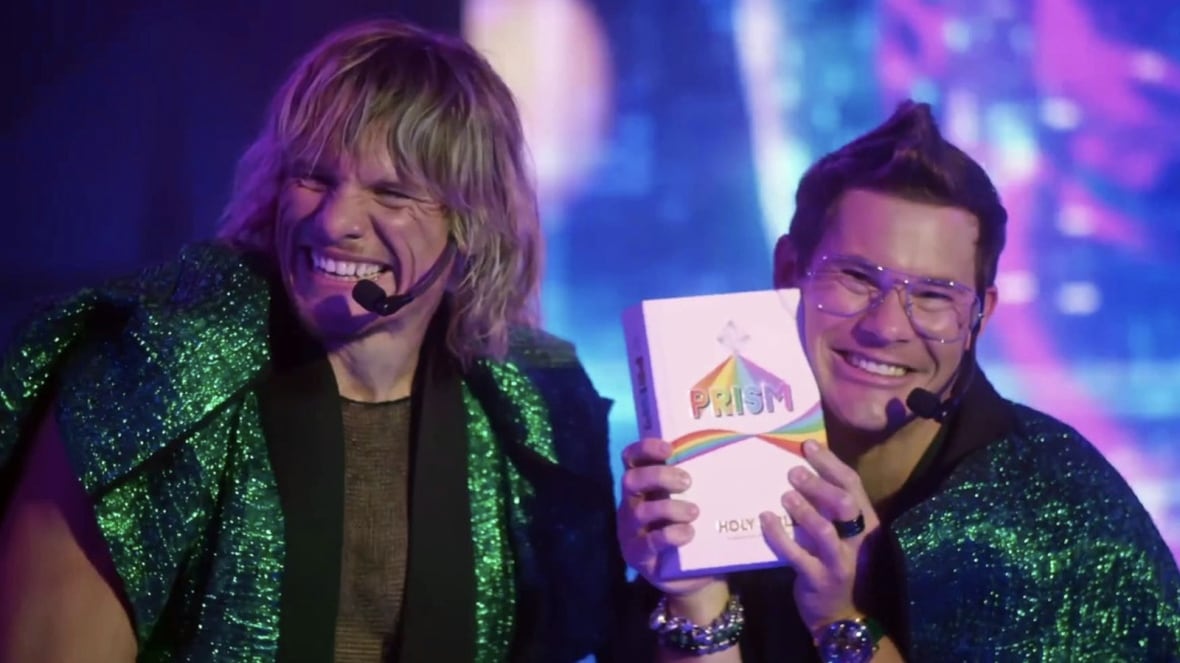God bless The Righteous Gemstones, the TV show that helped me reckon with my religious trauma
Jay Ashdown on how the megachurch-centric HBO series allowed him to heal

Emerging Queer Voices is a monthly LGBTQ arts and culture column that features different up-and-coming LGBTQ writers. You can read more about the series and find all published editions here.
Pastor Steven Furtick's gold cross chain gleams in the stage lights as he throws his hands out to the crowd off-camera. His scoop-neck heather-grey tee shows off his chest hair, and the hem dangles below his crotch like a gauzy tunic.
Then just a child — toted to the nearest Elevation Church satellite location and hopped up from a rousing worship session — I look up at the projector screen livestreaming Furtick's sermon all the way from the megachurch's North Carolina headquarters. The captive crowd on-screen watches his muscles pop as he sweats, shouts and stretches his arms upward for the glory of God.
Given the stream of tithes that flow into megachurches — with millions of it going to their leaders — the legions of devotees are owed a show. At the core of these followings is the plastered-on charisma the celebrity pastors exhale into the stadium subwoofers. This sheen of masculinity is painted on in layers until they are a mass of tanning oil, WWJD dog tags and taper fades. Wearing my favourite Sunday dress and flats all those years ago, I took in these signposts of a good Christian man and shelved them in the back of my mind.
The megachurch service, first and foremost, is shiny. On the concert venue-size stage, keyboards are positioned amid strobe lights, giant fluorescent crosses and TV screens displaying karaoke lyrics. The worship band isn't playing your grandma's hymns; five electric guitars wail over a rocking rendition of "Amazing Grace." Youth group community-building comes in the form of free trips to Sky Zone trampoline park and Canada's Wonderland, God's natural wonders.
No show streaming right now captures the gaudiness of megachurch culture more keenly than The Righteous Gemstones, the latest series from HBO comedy veteran Danny McBride, which just wrapped in May.
It follows the bumbling adult children of Gemstone Ministries' co-founder Eli Gemstone (John Goodman): Jesse (McBride), Judy (Edi Patterson) and Kelvin (Adam Devine). These siblings bathe in the glitz: living in Greek pillar-adorned mansions on the massive Gemstone compound, driving to weekly services in their high-end cars, and decking themselves out in gold bling and flamboyant clothing galore.
It's a known (and offensive) trope that the world's most notorious church pastors are secretly super gay. So it's only natural then that Kelvin, the whiny fauxhawked youngest Gemstone sibling, and leader of the Gemstone Ministries youth group, just so happens to be queer.
For the first three seasons, up until he officially comes out, Kelvin is desperate to be seen as masc, despite his flair for theatrics and not-so-subtle attraction for his platonic live-in companion Keefe (Tony Cavalero). In Season 2, he takes his desperation a step further and assembles a live-in discipleship of ginormous constantly shirtless and oiled musclemen, the God Squad, to beef up the youth group's coolness.
However, in response to Kelvin's dictatorial leadership, the Squad soon devolves into a psychosexually torturous anarchist commune. After a series of humiliations collapse the façade of his self-made Jesus-figure role, his remaining authority over the group crumbles.
Eli, his own father, breaks Kelvin's thumbs in a petty public fight witnessed entirely by the Squad. Days later, his buff-est disciple beats him in a feat of strength of his own design: handily carrying a solid concrete cross on his back as Keefe, in Kelvin's place, collapses under the weight. In the end of the God Squad's saga, his only role left is to glumly mop the floors of the gym he'd designed to train his once-lowly followers.
Though fictional, Kelvin's homoerotic antics on Gemstones reveal a glimmer of truth: hegemonic masculinity is doomed to cave in under pressure.
Before I began watching Gemstones last year, my For You page brought me down internet rabbit holes of Baptist ministry content. I watched men lifting barbells until they were purple in the face to the soft acoustic soundtrack of Chris Tomlin's "Our God." I witnessed buttoned-up pastors speak in tongues, supposedly coaxing the devil out of their shaking disciples. And I would binge clips of TV host Steve Harvey's motivational speeches — shot in front of a studio audience on the Family Feud set while the crew was on break — about becoming a millionaire through prayer.
In the early days of my testosterone uptake, I would jokingly compare my shots to steroids, an ephemeral notion that would become delusional reassurance on days I felt especially non-passing. I thought often about the celebrity pastors who grabbed their audiences' attention by being the kind of men their pew fillers wanted to see. How easy it must be to command an arena-size room when you hit all the marks of a perfect man, no matter how repugnant that standard of "perfect" may be.
Newly out, Kelvin spends Gemstones' final season grifting, but this time, with flair. He decks himself out in a metallic sleeveless coat to establish Prism, his LGBTQ+ prayer movement at Gemstone Ministries. After ending his lifelong feud with toxic masculinity, however, Kelvin enters a new battle — with homophobia.
He's nominated for Top Christ-Following Man of the Year and is slammed for being a DEI pick. During a televised panel discussion with the nominees, a pastor derails the conversation to preach about his discomfort with a "homosexual" being in the running. And Kelvin's older brother, Jesse, watches from home, thoughtfully and respectfully perturbed.
With queerness, Gemstones contradicts itself. The bread and butter of the show's charm — moments the trio get to riff off each other while bickering — is undermined by a script that can only go so far. If the other siblings mock Kelvin with lisps and effeminate gestures, the runtime doesn't end before they glumly apologize or somehow offer their emotional support. In a show that's normally not afraid to go there with pitch-black wit, the writers' nervousness about homophobia, ironically, keeps them prodding at the issue from 10 feet away.

Turns out comedy has fallen short in cutting to the core of Christian masculinity and how it contributes to harmful stereotypes. Most jokes about fundamentalist men (seen on Gemstones, gay Twitter and ironic Gen Z meme accounts alike), often place their desperation for manhood as the setup and their disastrous inability to meet it as the punchline.
And as the narrative unfolds — be it with the devolution of Kelvin's macho God Squad or a wordless repost of a Mark Wahlberg Reel — it engages with the same rhetoric it was implicitly supposed to challenge. By highlighting insecure influencers' failure to be the "perfect" man, we may be validating their idea of so-called perfection.
Though church attendance is declining, trad culture continues to grow in popularity as an aspirational lifestyle. The ever-expanding Christo-fascist-tradwife-gym-bro content sphere reinforces the straight hegemony some of us work all our lives to unlearn and eschew.
When megachurch pastors juice up, grow out their beards to match their godawful fades, and show off photos of their gingham-wearing stay-at-home wives and kids, they unabashedly play to the dominant culture. Only those with the wherewithal and emotional support can escape it.
There's a lot to love in the darkness of televised Christianity. The 700 Club brought us Tammy Faye and unleashed a mélange of zany iconography now seen in faint traces on RuPaul's Drag Race and Pee-Wee's Big Adventure.
My love for camp — facilitated by The Righteous Gemstones' glittering, if flawed, satire — has bloomed out of the gaudiness of Baptist masculinity. Somehow, church is more comforting than petrifying to ponder when your destiny is cemented elsewhere. When you design your own standards, you only have to answer to yourself.



